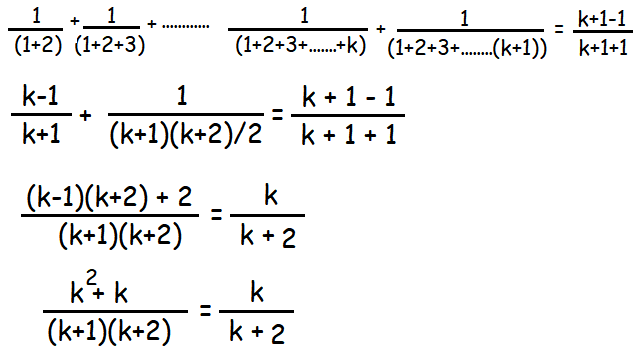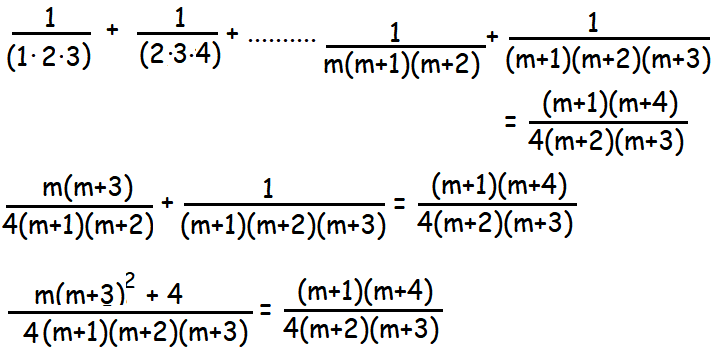PROBLEMS ON MATHEMATICAL INDUCTION
Subscribe to our ▶️ YouTube channel 🔴 for the latest videos, updates, and tips.
Question 1 :
Using the Mathematical induction, show that for any natural number n ≥ 2,
[1/(1 + 2)] + [1/(1 + 2 + 3)] + [1/(1 + 2 + 3 + 4)] + · · · + [1/(1 + 2 + 3 + · · · + n)] = (n − 1)/(n + 1)
Solution :
Let p(n) = [1/(1 + 2)] + [1/(1 + 2 + 3)] + [1/(1 + 2 + 3 + 4)] + · · · + [1/(1 + 2 + 3 + · · · + n)] = (n − 1)/(n + 1)
Step 1 :
put n = 2
p(2) = p(n) = [1/(1 + 2)] = (2 − 1)/(2 + 1)
1/3 = 1/3
Hence p(2) is true.
Step 2 :
Let us assume that the statement is true for n = k
p(k) = [1/(1 + 2)] + [1/(1 + 2 + 3)] + [1/(1 + 2 + 3 + 4)] + · · · + [1/(1 + 2 + 3 + · · · + k)] = (k − 1)/(k + 1) ----(1)
We need to show that P(k + 1) is true. Consider,
Step 3 :
Let us assume that the statement is true for n = k + 1
p(k+1)
p(n) = [1/(1 + 2)] + [1/(1 + 2 + 3)] + [1/(1 + 2 + 3 + 4)] + · · · + [1/(1 + 2 + 3 + · · · + (k+1))] = (n − 1)/(n + 1)
By applying (1) in this step, we get

k(k+1)/(k+1)(k+2) = k/(k+2)
k/(k+2) = k/(k+2)
Hence, by the principle of mathematical induction n ≥ 2,
[1/(1 + 2)] + [1/(1 + 2 + 3)] + [1/(1 + 2 + 3 + 4)] + · · · + [1/(1 + 2 + 3 + · · · + n)] = (n − 1)/(n + 1)
Question 2 :
Using the Mathematical induction, show that for any natural number n,
[1/(1.2.3)]+[1/(2.3.4)]+[1/(3.4.5)]+ · · · +[1/(n.(n + 1).(n + 2))]
= n(n + 3)/4(n + 1)(n + 2)
Solution :
Let p(n) = [1/(1.2.3)]+[1/(2.3.4)]+[1/(3.4.5)]+ · · · +[1/(n.(n + 1).(n + 2))] = n(n + 3)/4(n + 1)(n + 2)
Step 1 :
Put n = 1
[1/(1.(1 + 1).(1 + 2))] = 1(1 + 3)/4(1 + 1)(1 + 2)
1/(1.2.3) = 1(4)/4(2)(3)
1/(1.2.3) = 1/(1.2.3)
Hence p(1) is true.
Step 2 :
Let us assume that the statement is true for n = m
[1/(1.2.3)]+[1/(2.3.4)]+[1/(3.4.5)]+ · · · +[1/(m.(m+1).(m+2))] = m(m + 3)/4(m + 1)(m + 2) --(1)
We need to show that P(m + 1) is true. Consider,
Step 3 :
Let us assume that the statement is true for n = m + 1
p(m+1)

By expanding L.H.S, we get
= (m(m2+6m+9) + 4)/4(m+1)(m+2)(m+3)
= (m3 + 6m2 + 9m + 4)/4(m+1)(m+2)(m+3)
= (m+1)2(m+4)/4(m+1)(m+2)(m+3)
= (m+1)(m+4)/4(m+1)(m+2)(m+3) --->R.H.S
Hence, by the principle of mathematical induction [1/(1.2.3)]+[1/(2.3.4)]+[1/(3.4.5)]+ · · · +[1/(n.(n + 1).(n + 2))]
= n(n + 3)/4(n + 1)(n + 2)
Subscribe to our ▶️ YouTube channel 🔴 for the latest videos, updates, and tips.
Kindly mail your feedback to v4formath@gmail.com
We always appreciate your feedback.
About Us | Contact Us | Privacy Policy
©All rights reserved. onlinemath4all.com

Recent Articles
-
How to Solve Challenging Math Problems in SAT
Feb 17, 26 10:31 AM
How to Solve Challenging Math Problems in SAT -
How to Solve the Hardest SAT Math Problems
Feb 17, 26 10:06 AM
How to Solve the Hardest SAT Math Problems -
The Hidden Patterns in Hard SAT Math Questions
Feb 17, 26 09:46 AM
The Hidden Patterns in Hard SAT Math Questions

